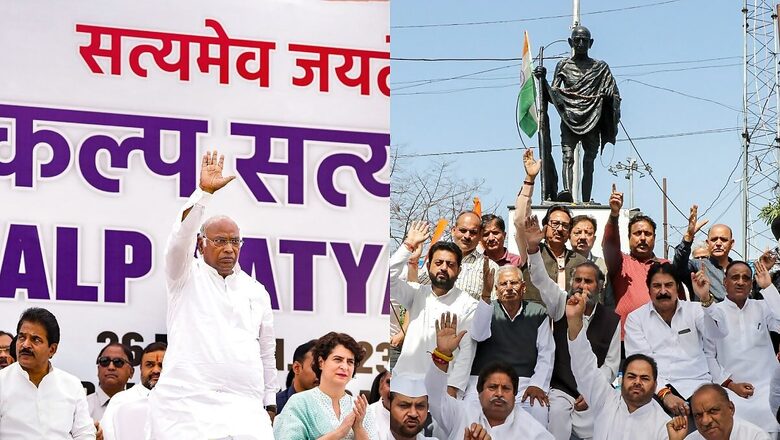
views
Home Minister Amit Shah, in alleging that the United Progressive Alliance (UPA) regime had tried to strong-arm him into implicating Narendra Modi (the then chief minister of Gujarat) in an ‘encounter’ death, makes the point that the Congress-led governments in the past have faced precisely the same accusations of abuse of power that are now being levelled against the BJP-led National Democratic Alliance (NDA).
During the UPA years, it was the Bharatiya Janata Party (BJP) which levelled charges of executive overreach and undermining of civil rights against the Congress. In 2013, Modi famously declared that the UPA regime was misusing the Central Bureau of Investigation (CBI) and other central agencies to target its political rivals – exactly what the Congress is now claiming.
The point is that governments enjoying an extended period in office will tend towards authoritarian forms, but are kept in line by a robust system of checks and balances. Only once in the history of Independent India were those checks and balances subverted, to impose Emergency.
When Anna Hazare launched his anti-corruption movement in 2011, ‘Team Anna’ claimed the UPA was so spooked by their success, that it launched a witch-hunt against them and their relatives. Delhi Chief Minister Arvind Kejriwal, then an activist, received a ‘dues recovery notice’ from the Income Tax (IT) department, and claimed the sudden demand was clearly prompted by the political bosses.
Baba Ramdev, a spiritual leader aligned with the BJP and a Hazare supporter, was detained and faced investigations on multiple counts. He, too, claimed that he was being victimised by a vindictive regime.
Meanwhile, far-Left groups accused the UPA of launching a ‘war’ against those fighting for the rights of tribal communities (which were being dispossessed by corporates), in the form of Operation Green Hunt.
Foreign-funded non-governmental outfits also cried foul, when the Manmohan Singh government began investigating their finances and cancelling their licences. He remarked that NGOs funded by the US and Scandinavian agencies were behind the anti-nuclear protests in India. The NGO brigade, which then protested against the UPA, is now training its guns at the NDA.
The Rashtriya Swayamsevak Sangh (RSS) found itself in the crosshairs during the UPA years. It went so far as to say that the Anti-Terrorism Squad (ATS) had let loose a ‘reign of terror’ while investigating Abhinav Bharat, a right-wing organisation, in connection with the 2006 bomb blasts in Malegaon. At the time, newspapers had reported that the ATS had ‘homed in’ on senior RSS leader Indresh Kumar. Congress leader Digvijay Singh made provocative remarks against the RSS, and sinister rumours of a plan to ban the organisation (for the fourth time) and arrest its leaders did the rounds in political circles.
Given its long history of overreach, the Congress cannot claim the high moral ground. From the Emergency onwards, it has been frequently criticised for misusing executive and legislative power to undermine civil rights and subvert the judiciary. The supersession of Supreme Court justices was a Congress invention, and it wasn’t until the Three Judges Case ruling that the government was deprived of that power.
In 1986, the Rajiv Gandhi government used its brute majority in Parliament to overturn the Supreme Court verdict in the Shah Bano case, for fear of alienating the minority vote bank. It was also perceived as having influenced the outcome of investigations into the 1984 mass murder of Sikhs, with the result that the perpetrators were not brought to justice.
When the Congress returned to power in 2004, on the back of the UPA coalition, after eight years in the wilderness, Modi was a prime target. As he won election after election and his popularity grew, it became urgent to neutralise him somehow. Central agencies were brought to bear against Modi and Shah; they were rigorously questioned, but the lack of hard evidence frustrated the investigators.
Prima facie, the Modi government had no role to play in Rahul Gandhi’s disqualification as a Member of Parliament (MP). A citizen filed a case against him; a judge found merit in the argument and sentenced him; once convicted, he was automatically ousted from Parliament. The Congress construction of events is that all of it was orchestrated by a malicious government. Hence, the black clothes, country-wide protests and stalling of Parliament. The Congress may well justify its response to the Gandhi imbroglio as a defence of democracy. This is, by no means, the first time it has accused the Modi government of being undemocratic, but it took the conviction of its de facto leader to galvanise the party into action.
The difference is one of attitude. When BJP leaders were targeted during Congress regimes, they took it in their stride. Coming from a milieu of hard struggle, they matter-of-factly accepted that harassment by the authorities was just one more hurdle to overcome. But the Congress comes from a mindset of entitlement, and cannot reconcile itself to the fact that the boot is now on the other foot.
Bhavdeep Kang is a freelance writer and author of ‘Gurus: Stories of India’s Leading Babas’ and ‘Just Transferred: The Untold Story of Ashok Khemka’. A journalist since 1986, she has written extensively on national politics. Views expressed are personal.
Read all the Latest Opinions here



















Comments
0 comment